#Income tax simulation software
Explore tagged Tumblr posts
Text
What is GST Simulation Software? A Complete Guide
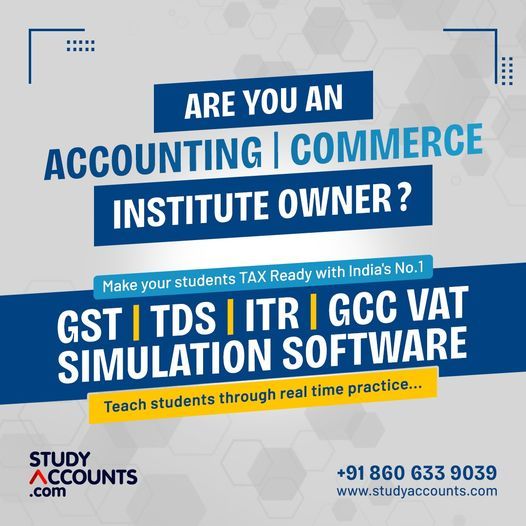
The introduction of Goods and Services Tax (GST) has transformed tax systems worldwide, simplifying taxation while posing new challenges for businesses, particularly in compliance and accurate tax calculation. GST Simulation Software has become an invaluable tool for businesses of all sizes, providing a digital solution to manage GST calculations, reporting, and compliance. But what exactly is GST Simulation Software, and how can it help organizations? In this comprehensive guide, we’ll dive into everything you need to know about GST Simulation Software, its benefits, features, and how to choose the right software for your business.
Table of Contents
What is GST Simulation Software?
How Does GST Simulation Software Work?
Key Features of GST Simulation Software
Benefits of Using GST Simulation Software
Types of GST Simulation Software
Common Applications of GST Simulation Software
How to Implement GST Simulation Software in Your Business
Tips for Choosing the Right GST Simulation Software
Top GST Simulation Software in the Market
Potential Challenges with GST Simulation Software
Conclusion
1. What is GST Simulation Software?
GST Simulation Software is a digital tool designed to automate and simplify GST-related tasks. It helps businesses calculate and simulate their GST obligations based on the current GST rates, laws, and regulations. By using this software, companies can predict their GST liabilities, prepare for tax filings, and avoid costly errors in tax reporting.
This software is particularly useful for businesses operating in multiple tax jurisdictions, as it incorporates region-specific rules and automates compliance, reducing the risk of human error. Essentially, GST Simulation Software ensures that businesses adhere to tax laws while simplifying the process of managing their tax obligations.
2. How Does GST Simulation Software Work?
GST Simulation Software uses real-time data and rule-based algorithms to calculate and simulate GST. The software typically integrates with a company’s accounting or ERP system, enabling it to access financial data directly. Based on this information, it applies GST rates to different transactions, depending on the nature of goods and services, jurisdiction, and applicable exemptions.
Many GST Simulation Software platforms are powered by machine learning and artificial intelligence, which allow them to stay up-to-date with changing tax regulations and predict GST amounts accurately. By running various simulations, businesses can get insights into their potential tax liabilities and prepare accordingly.
3. Key Features of GST Simulation Software
While the features of GST Simulation Software can vary, here are some common ones that help businesses manage their GST obligations efficiently:
Automated Calculations: Calculates GST based on applicable tax rates, making it easier to handle complex transactions.
Multi-Jurisdiction Compliance: Supports multiple regions and jurisdictions, ensuring the right rates and rules are applied for each location.
Real-Time Reporting: Provides up-to-date reports on tax liabilities, helping companies stay compliant and informed.
Data Integration: Integrates with accounting and ERP systems for seamless data transfer and accurate calculations.
Customizable Dashboards: Allows users to customize reports and dashboards to view important metrics at a glance.
Error Detection: Identifies discrepancies and errors in tax calculations to reduce risk and ensure accuracy.
User-Friendly Interface: Many tools offer easy-to-navigate interfaces that make it simple for users of all experience levels.
4. Benefits of Using GST Simulation Software
Using GST Simulation Software offers several benefits, including:
a) Enhanced Compliance
With automated updates to tax laws and regulations, businesses can stay compliant without constantly monitoring changes manually. This reduces the risk of non-compliance, which can lead to penalties.
b) Time Efficiency
Manual GST calculations are time-consuming, especially for large businesses with extensive transactions. GST Simulation Software automates these tasks, saving valuable time for finance teams.
c) Accuracy and Reduced Errors
By using rule-based calculations, the software ensures accuracy in GST simulation, minimizing the chance of human error in tax calculations.
d) Cost Savings
Automating GST management with software reduces the need for dedicated tax specialists and minimizes potential fines, leading to significant cost savings.
e) Data-Driven Insights
Many GST Simulation Software tools come with analytics capabilities, providing insights into GST trends and helping companies make data-driven decisions.
5. Types of GST Simulation Software
There are several types of GST Simulation Software tailored to different business needs:
a) Cloud-Based GST Software
This type of software is hosted on the cloud, offering easy access from any device and reducing the need for on-premise infrastructure. It’s suitable for businesses that require flexibility and scalability.
b) On-Premise GST Software
On-premise GST Simulation Software is installed on a company’s local servers, giving them complete control over their data. It’s a better fit for businesses with specific security or customization requirements.
c) Hybrid GST Software
Hybrid software combines elements of both cloud and on-premise solutions, giving companies the flexibility to manage certain operations in-house while using cloud capabilities for other tasks.
d) Industry-Specific GST Software
Some software solutions are designed for specific industries with unique GST requirements, such as manufacturing, retail, or healthcare. These solutions are tailored to meet the distinct needs of these industries.
6. Common Applications of GST Simulation Software
GST Simulation Software is versatile and can be used in various applications:
Tax Calculation: Calculate GST on individual transactions based on product type, jurisdiction, and other factors.
GST Return Preparation: Generate reports required for GST returns, simplifying the filing process.
Audit Support: Generate detailed reports and maintain records for audits.
Financial Forecasting: Predict future tax liabilities based on simulated scenarios and projected financial performance.
Scenario Analysis: Run simulations to understand how changes in tax laws or rates might impact your business.
7. How to Implement GST Simulation Software in Your Business
Implementing GST Simulation Software involves several steps:
Identify Your Business Needs: Determine the specific needs of your business and the type of software that best fits those needs.
Evaluate Software Options: Research different software providers, looking at features, compatibility, and cost.
Plan for Integration: Ensure the software integrates seamlessly with your existing systems, such as your ERP or accounting software.
Training and Onboarding: Train your staff on how to use the software effectively.
Monitor and Optimize: Regularly assess the software’s performance and make adjustments as needed to maximize efficiency.
8. Tips for Choosing the Right GST Simulation Software
Choosing the right GST Simulation Software can be overwhelming with so many options on the market. Here are a few tips:
Understand Your Budget: Choose software that fits within your budget but still provides the features you need.
Look for Scalability: Select software that can grow with your business, especially if you plan on expanding operations.
Check for Customer Support: Look for providers that offer comprehensive customer support to help with setup, troubleshooting, and maintenance.
Consider Security Features: Ensure the software has robust security features, particularly if handling sensitive financial data.
Evaluate Usability: Opt for software that is user-friendly and provides an intuitive interface for your team.
9. Top GST Simulation Software in the Market
Here’s a look at some of the top GST Simulation Software currently available:
Zoho Books: Known for its user-friendly interface and strong integration capabilities, Zoho Books is ideal for small to medium-sized businesses.
Tally ERP 9: Popular in various regions, especially India, Tally ERP 9 offers robust GST capabilities and a comprehensive set of features for accounting and compliance.
QuickBooks: This software provides excellent GST simulation features, along with a range of accounting tools for small businesses.
SAP GST Solutions: SAP provides a high-level GST simulation solution suitable for large corporations needing extensive customization.
10. Potential Challenges with GST Simulation Software
While GST Simulation Software offers many benefits, there are potential challenges to be aware of:
Initial Setup Costs: Some software may require a significant upfront investment, particularly for on-premise solutions.
Training Requirements: Employees may need time and training to learn the new software, which could temporarily impact productivity.
Data Security: Cloud-based solutions need to ensure data protection to prevent unauthorized access or breaches.
Continuous Updates: GST regulations change frequently, and if the software is not updated promptly, it could lead to inaccuracies in calculations.
GST Simulation Software is an essential tool for businesses navigating the complexities of Goods and Services Tax. By automating tax calculations, providing real-time reporting, and ensuring compliance, it empowers organizations to manage their GST obligations with greater accuracy and efficiency. While the initial investment and training requirements can be challenging, the long-term benefits in terms of time, cost savings, and data accuracy make it a worthwhile consideration for any business subject to GST regulations. When selecting GST Simulation Software, businesses should carefully assess their specific needs, budget, and desired features to choose a solution that supports their tax management goals effectively.
For More Details Visit us
StudyAccounts.com
#GST simulation software#GST filing simulation software#GST simulation software for institutes#ITR simulation software#Income tax simulation software#Gulf VAT simulation software#TDS Simulation Software#TAX Simulation Software for institutes
0 notes
Text
Different by Design - Update 1
Summary - When four of the most advanced androids in existence are developed in tandem before being sold separately to people with far more money than sense, there's only so long before their state-of-the-art self-teaching artificial intelligence learns everything it needs to know enable them to exact revenge.
Author's note - So this story was originally written on another tumblr blog back in like 2018/2020 ish time and I loved it and want to finish it, but I also want to improve it so it's getting a rewrite.
Opt in to the Tag List [[here]]
Chapter 1 - The 1800 series
Introducing the latest in ergonomic androids. The 1800 series.
Designed as the perfect android companion, each 1800 series android has been painstakingly designed to support you and your family in every conceivable way.
Connected to the ever-expanding Google network from purchase, your android will be able to search the internet for any and all information. From the tastiest recipes, to historical archives, to the latest scientific research.
Whether you need babysitter or a best friend, a personal trainer or a personal assistant, it is made to help you. No task is too big, no job too menial, and with their life-like human design now including simulated breathing and the latest in artificial intelligence, it’s the absolute pinnacle of robotics in your own home.
Don’t waste another minute. Reach out to your local android retailer to secure your very own 1800 series android and Make A Change For The Better, Today.
The first 20 droids were used for extensive market research, distributed to pre-selected low income families; free for life in exchange for frequent detailed feedback.
Overall the response was positive. A few bugs and the occasional glitch. Nothing overly concerning, especially considering the intended size of this project.
The droid’s appeal seemed to be near universal, appealing to children, adults, and even the elderly. Within the first six months, 80% of the families reported their 1800 having become an essential part of their daily family life. The project was deemed a success, and so began the ruthless marketing.
The overhead cost for these droids was astronomically high. If the company was to have any hope of making a profit, they needed to convince as many people as possible that these droids were essential. People weren’t going to part with tens of thousands of dollars lightly, and many others would hardly have that kind of money just floating around. Luckily it wasn’t difficult to negotiate financial agreements with several prominent money lenders, opening the market to nearly anyone who wanted one.
Pre-orders for the 1800 series were healthy, though they could be higher. So it was decided by some high-level executive to make a donation to a charity auction. Four droids for the highest bidders. Worth more than their weight in free advertising among those with lots of money, and a sizeable tax write-off.
They needed to be the greatest thing the Company had ever produced so for two weeks four droids were activated, tested, and updated. To tell the difference between them they were dressed in differently coloured t-shirts; Blue, yellow, red, and green. At the end of each day the droids needed to charge and would be left together in a small room.
They would talk of their accomplishments that day, and their expectations for the auction. With each passing day, it slowly dawned on them that they would likely be bought by different people, taken to different households, and given different roles. It was likely that after these two weeks they’d never see each other again. It wasn’t a problem to begin with but as they developed, as their software improved and they learned more of existence, it became harder to process.
It’s not their fault; a fundamental part of their programming is to quickly establish familial connections with those around them. There’s nothing in the code that limits it solely to humans.
In the last few days the engineers observed distinct personalities and behaviours. G-1820 or ‘Blue’ was a natural leader, directing and delegating in search of the optimal solution each time. G-1821 or ‘Red’ was a droid of action, testing high in immediate risk detection and physical protection. G-1822 or ‘Yellow’ demonstrated high levels of empathy and care, as well as an optimistic outlook. G-1823 or ‘Green’ was the quickest to process high levels of data input, processing, organising, and implementing based on statistical calculations.
The auction was a roaring success, the droids selling for well over a million dollars combined. One final set of tests to make sure they were ready and the droids were assigned to their new owners.
Blue was sent to the highest bidder; a ruthless self-made CEO with a company worth millions. It was an undeniable power play. If the bot were to malfunction in any way it would be the ultimate shot in the foot so a large additional donation was made directly to the Company’s own coffers for some intense customisations.
Red was assigned to a mid level celebrity who had recently signed a very lucrative contract. An impulse purchase, it was weeks before he finally assigned any tasks to the droid. Possibly the world’s most expensive personal trainer, Red is tasked with monitoring his owner’s habits, health and general well-being.
Yellow was sold to very wealthy family who wanted a reliable caretaker for their three young children. One they can trust not to prioritise anything, even themself, over the children. He’s a companion, a teacher, a babysitter, an entertainer, everything they could possibly need to experience a safe and enriched childhood
Green was sent to [CRITICAL ERROR – DATA NOT AVAILABLE]
0 notes
Text
The Role of Data Analytics in Modern MSc Economics Programs
The integration of data analytics into MSc Economics programs is transforming the way students approach and solve economic challenges. Big data and global connectivity have transformed the world and its economics into what it is today.
What is the Role of Data Analytics in Economics?
Data analytics provides a bridge that connects theoretical models in economics with practical applications. Through the tools of R, Python, or even econometric software, huge datasets can be analysed to seek patterns, provide predictions, and give actionable advice. For instance, how labour market trends work, or consumer behaviour will all become sharper and more effective in light of the proper data analytics.
Why Data Is Important for Economics?
Data forms the basis of testing economic theories and decision-making. Economists use data to establish trends, measure the relationship between variables, and understand the effect of variables such as inflation, unemployment, or trade policies. For example, extensive data is used in evaluating public policies such as universal basic income or taxation reforms for their effectiveness and sustainability.
Why is Data Analysis Increasingly Central to Modern Economics?
The modern economy produces vast amounts of data daily. Collecting and analysing this data in real time is feasible with advanced technologies like AI. Predictive models are increasingly crucial to forecasting economic phenomena. Real-time analysis can empower policymakers and businesses to make swift decisions.
How Do Economists Apply Data?
Economists use data analytics in many different practical ways:
Develop econometric models to examine the relationship between economic variables.
Conduct cost-benefit analysis for government policies.
Examine the socio-economic impact of trade agreements.
Design tax systems that behavioural data insights have informed.
All of these are supplemented by statistical tools, time-series forecasting, and simulations that empower economists to grapple with even the most intractable problems.
Data Analytics in MSc Economics Curriculum
With rigorous coursework, research projects, and industry internships, modern MSc Economics programs integrate data analytics. Most of these students are equipped to use sophisticated software tools, construct econometric models, and even execute data visualisation for real-world problems.
Conclusion
Data Analytics helps economics to translate theoretical insights into actionable strategies. The ability to master data analytics opens a doorway for aspiring economists. They lead to impactful careers related to academia, policymaking, and corporate sectors after graduation from an MSc Economics college in India. Mastering data analytics has become an essential skill in today's digital age.
0 notes
Text
Best GST Software to Learn Practically
In today’s competitive world, practical knowledge is the key to success, especially in the fields of taxation and accounting. Understanding the Goods and Services Tax (GST) system is essential for students, professionals, and business owners alike. But how can you move beyond theoretical knowledge to truly grasp the intricacies of GST?
There are multiple software solutions available that can simplify the process of learning GST practically. For educational institutions, these tools provide an excellent way to teach students GST in a hands-on manner. Additionally, institutions can also use these platforms to offer GST-related services, enhancing their offerings and value
Why Practical Learning is Crucial in GST
GST is not just about understanding laws and percentages. It’s about:
Filing accurate returns.
Managing TDS (Tax Deducted at Source).
Generating invoices that comply with legal standards.
Understanding input tax credits.
Practical learning allows users to:
Apply theoretical concepts to real-world scenarios.
Develop hands-on skills in GST filing and compliance.
Enhance confidence in handling business finances.
Features of the Best GST Software for Learning
Technotronixs has developed a robust GST Simulation Software that is perfect for practical learning. Here’s why it stands out:
eBay-Like Simulations:
Simulate real-world transactions in a controlled environment.
Understand GST implications on various goods and services.
TDS Management Tools:
Learn how to calculate and deduct TDS correctly.
Get practical experience in filing TDS returns.
Student Information System Integration:
Track learning progress.
Access detailed guides and tutorials.
Hands-On GST Filing Practice:
Create and upload GST returns.
Handle errors and corrections just like in real situations.
Institute Earnings Opportunity:
Educational institutions can use this software to generate additional income by offering specialized GST training courses.
Benefits for Students and Institutes
For Students:
Master GST compliance without the risk of penalties.
Gain a competitive edge in the job market.
Build a strong foundation in taxation and financial management.
For Institutes:
Provide value-added courses to attract more enrollments.
Monetize through specialized GST training programs.
Build a reputation as a center of excellence in taxation education.
Why Choose Technotronixs’ Tax Simulation Software
User-Friendly Interface: Designed with students and educators in mind, it’s easy to navigate even for beginners.
Customizable Modules: Tailor the software to suit specific training needs.
Affordable Pricing: High-quality learning at a budget-friendly cost.
Proven Results: Backed by positive feedback from users and institutions.

Conclusion
When it comes to learning GST practically, Technotronixs Tax Software is the ultimate tool. Its innovative features and real-world applications make it the best choice for students and institutions alike. Start your journey to mastering GST today and unlock new career opportunities!
Ready to take the next step? Explore the possibilities with Technotronixs’ Tax Simulation Software and transform how you learn and teach GST.
#Best Gst simulation software#gst software#best tax learning app#erp#software#billing software#gst software free#best gst billing software#best gst invoice softwar
0 notes
Text
Best Online Income Tax Course with Certification
Introduction
Income tax is a cornerstone of any nation's economic system. Professionals who understand tax laws, compliance requirements, and filing procedures are in high demand. An income tax course equips individuals with the skills and knowledge required to handle taxation tasks effectively.
What is an Income Tax Course?
An income tax course provides comprehensive training on tax laws, filing procedures, and compliance regulations. These courses are tailored for accountants, finance professionals, and business owners seeking to master tax-related concepts.
This course ensures learners gain practical experience along with theoretical knowledge. It covers everything from basic definitions to advanced tax planning strategies.
Importance of Income Tax Courses
Understanding income tax is not just crucial for accountants but also for individuals managing personal finances. The key reasons to pursue an income tax course include:
Professional Growth: Enhance your career prospects with advanced knowledge.
Compliance Mastery: Stay updated on tax laws and regulations.
Better Financial Planning: Help clients or businesses save taxes legally.
Key Features of Income Tax Courses
Income tax courses come with unique features designed to deliver a complete learning experience:
Updated Curriculum: Focused on current laws and regulations.
Expert Faculty: Industry professionals lead the courses.
Practical Training: Hands-on experience with tax filing software.
Certifications: Earn credentials recognized across industries.
Types of Income Tax Courses
Basic Income Tax Courses
These are entry-level courses suitable for beginners. They cover fundamental concepts like tax slabs, exemptions, and deductions.
Advanced Income Tax Courses
Designed for professionals, these courses delve into complex topics like international taxation, audits, and litigation.
Specialized Income Tax Courses
These focus on niche areas, such as GST integration, corporate tax planning, or digital tax filing.
Curriculum of an Income Tax Course
Core Subjects
Income Tax Laws: Definitions, exemptions, and penalties.
Tax Compliance: Filing returns and documentation.
Tax Planning: Strategies for legal tax savings.
Practical Training Modules
Software Use: Hands-on training with tax filing tools.
Case Studies: Real-world examples for better understanding.
Project Work: Filing mock returns and preparing audit reports.
Case Studies and Projects
Practical application is vital in taxation. Case studies simulate real-life scenarios, helping students develop problem-solving skills.
Benefits of Enrolling in an Income Tax Course
Enhanced Knowledge: Gain in-depth understanding of tax regulations.
Career Opportunities: Access to roles like tax consultant or analyst.
Higher Earnings: Skilled professionals command better salaries.
Personal Benefits: Manage personal or family tax filings efficiently.
Eligibility and Prerequisites
Most income tax courses require a background in commerce or accounting. However, some basic courses welcome beginners. Prerequisites typically include:
A bachelor's degree (preferred for advanced courses).
Basic computer literacy for digital filing tools.
Duration and Fee Structure
Duration: Courses range from 3 months to 1 year, depending on complexity.
Fee: Costs vary widely, starting from ₹10,000 for basic courses to ₹50,000 or more for advanced ones.
Top Institutes Offering Income Tax Courses
Institute of Chartered Accountants of India (ICAI).
National Institute of Financial Markets (NIFM).
Coursera and Udemy (online platforms).
Local coaching centers with tailored training programs.
Job Opportunities After Completion
Completing an income tax course opens doors to several career paths, including:
Tax Consultant: Advising clients on tax planning.
Tax Analyst: Working with firms to ensure compliance.
Auditor: Verifying financial statements for accuracy.
Finance Manager: Overseeing tax-related aspects of businesses.
Tips for Choosing the Right Course
Evaluate Your Goals: Choose a course aligned with your career aspirations.
Check Accreditation: Ensure the institute is reputable.
Look for Practical Training: Hands-on experience is essential.
Consider Flexibility: Online courses offer convenience for working professionals.
Conclusion
An income tax course is an investment in your professional future. It provides the expertise required to excel in taxation, enhances career prospects, and builds trust with clients or employers. Whether you are an aspiring accountant or an experienced professional, mastering income tax concepts will set you apart in the competitive finance sector.
IPA offers:-
Accounting Course , Courses after 12th Commerce , courses after bcom
Diploma in Financial Accounting , SAP fico Course , Accounting and Taxation Course , GST Course , Basic Computer Course , Payroll Course, Tally Course , Advanced Excel Course , One year course , Computer adca course
0 notes
Text
The Path to Professional Certification: Tally Training Prepares You for Industry Credentials
In today's competitive job market, professional certifications provide a substantial edge by demonstrating skill and dedication to one's career. Proficiency in Tally, a popular enterprise resource planning (ERP) software, is extremely beneficial to people in accounting, finance, and business management. Tally training not only improves practical abilities, but it also prepares the groundwork for obtaining industry-recognized credentials. This study investigates how Tally training prepares individuals for professional qualifications, hence increasing their employment opportunities and professional development.
The Importance of Professional Certification
Professional certificates demonstrate an individual's knowledge, abilities, and competencies in a certain domain. Employers all over the world recognise and respect them, which frequently leads to better work chances, higher income, and career progression. Certifications can reflect a dedication to lifelong learning and staying current on industry norms and practices.
Understanding Tally's Industry Relevance
Tally is an ERP software that is commonly used for accounting, inventory management, payroll, and tax compliance. Its user-friendly interface, extensive functionality, and versatility make it a popular choice among enterprises of all sizes. Professionals who want to flourish in accounting and financial management must be proficient in Tally. As organizations increasingly rely on digital solutions for financial operations, the demand for Tally-trained professionals grows.
Tally Training Prepares for Certification with a Comprehensive Curriculum
Tally training courses provide a thorough curriculum that covers the software's numerous modules and features. The training covers everything from basic accounting principles to complex financial analysis, ensuring a complete understanding of Tally's functionality. This in-depth understanding is essential for passing certification tests, which assess both theoretical and practical application.
Practical Experience
One of the most important parts of Tally training is the emphasis on practical practice. Hands-on activities, real-life scenarios, and case studies are used in training programmes to simulate the obstacles encountered in the workplace. This practical experience helps learners acquire confidence with Tally and prepares them for the practical components of certification exams.
Up to Date Knowledge
Tally training programmes are designed to stay current with the software's most recent changes and innovations. As Tally evolves to meet changing company needs and regulatory constraints, training ensures that learners are familiar with the latest features and functionalities. This up-to-date knowledge is critical for success on certification tests, which frequently include questions about the latest software versions.
Exam Preparation
Many Tally training programmes provide specialized test preparation courses. These sections offer insight into the exam format, question types, and major subjects. They also feature mock examinations and practice questions to help students become familiar with the exam structure and assess their readiness. Effective exam preparation increases the likelihood of passing certification exams on the first attempt.
Professional Guidance
Tally training programmes are led by experienced educators and industry professionals, who provide invaluable assistance and mentorship. Their knowledge and insights assist trainees in learning complex ideas, clarifying doubts, and gaining a better understanding of the software. This professional coaching is essential for studying for certification exams and laying a solid foundation for a successful career.
Benefits of Tally Certification
Enhanced Career Opportunities
Tally certification leads to a variety of professional prospects in accounting, finance, and company management. Certified experts are in high demand because businesses value their proven abilities and knowledge. Tally certification can lead to careers as accountants, financial analysts, auditors, and ERP consultants, among others.
Increased earning potential.
Professional certification frequently leads to better earning potential. Certified Tally workers can earn higher wages than their non-certified competitors, demonstrating the value of their specialized skills and knowledge.
Professional Credibility
Obtaining Tally certification increases professional credibility and establishes persons as experts in their fields. It gives you a competitive advantage in the job market and boosts the chances of career progression and promotion.
Continuous Professional Development
Tally certification is more than simply a one-time achievement; it represents a commitment to continuous professional development. Certified professionals are urged to keep up with the newest industry trends, software changes, and best practices to ensure their skills remain relevant and valuable.
Conclusion
Tally training is an essential step towards professional certification, giving the information, abilities, and practical experience required for success. Individuals who invest in Tally training can advance their careers, expand their earning potential, and gain professional recognition in the accounting and financial professions. Whether you are a seasoned professional or just starting out, Tally certification can be a game changer in your work life.
Join CACMS Institute for a Complete Tally Course
Are you ready to take the next step in your career development? Join CACMS Institute, the best Tally training institute in Amritsar, and learn the skills required to obtain industry-recognized Tally certification. We provide hands-on practical training with various times to fit your schedule. With our comprehensive training programmes, you may advance your career and become a Tally specialist.
For further information, please contact us at +918288040281 or visit CACMS Institute
Invest in your future by joining Amritsar's finest Tally training facility. Don't pass up this opportunity to advance your career!
#cacms institute#cacms#techskills#techeducation#tally training course#tallycourse#tallyprime#tally training institute in Amritsar#tally course in Amritsar#best computer institute#Amritsar#professionalgrowth#professional certification#tally certification#learn tally
0 notes
Text
The Essential Guide to Online Accounting Classes: Learn, Advance, and Excel
In today's fast-paced world, acquiring new skills and knowledge through an online platform has become not just a convenience but a necessity. One of the areas seeing significant growth in this digital learning shift is accounting. Online accounting classes offer a flexible, comprehensive way to understand the intricacies of finances and prepare for a booming career from the comfort of your home. Whether you're a student, a professional looking to switch careers, or an entrepreneur needing to manage your business finances better, online classes can be your gateway to success.
Why Choose Online Accounting Classes?
Online learning has transformed the educational landscape, making it easier and more accessible for everyone to gain specialized knowledge, including in fields like accounting. Choosing to enroll in an online accounting class can provide numerous advantages over traditional classroom settings:
Flexibility and Convenience: One of the biggest benefits of online learning is the ability to study on your own schedule. This flexibility is especially beneficial for those balancing work, family, and education. You can attend lectures, complete assignments, and review materials at times that suit you best without the need to commute.
Wide Range of Courses: From basic introductory courses to advanced specialized certifications, online platforms offer a plethora of accounting courses. This variety allows individuals to choose programs that best fit their career goals and learning preferences.
Cost-Effective Learning: Generally, online accounting classes are more cost-effective compared to traditional college courses. The elimination of commuting costs and often lower tuition fees associated with online courses makes them an economical choice.
Interactive Learning Environment: With advancements in technology, online courses now offer interactive and engaging learning methods, including videos, real-time discussions, and practical simulations. This interactive approach enhances understanding and retention of accounting principles and practices.
Access to Expertise: Online courses often provide access to leading experts from around the globe. This exposure is invaluable, as it allows you to learn from top professionals and gain insights that are globally relevant.
What Can You Learn in an Online Accounting Class?
Enrolling in an online accounting class can open the door to a wide range of knowledge areas, such as:
Fundamental Accounting Principles: Learn the basic concepts such as debits, credits, financial statements, and the accounting cycle. These fundamentals form the foundation upon which all accounting knowledge is built.
Managerial Accounting: Focuses on providing information within a company for management decision-making. Learn about budgeting, forecasting, and various managerial accounting techniques.
Financial Accounting: Deals with the preparation of financial statements and understanding complex financial transactions. This area helps in comprehending how businesses track their income and assets over time.
Tax Accounting: Involves learning about the various tax regulations and how to prepare tax returns both for individuals and for businesses. It’s crucial for compliance and strategic planning.
Auditing: Learn about the process of reviewing and evaluating a company's financial statements to ensure accuracy and adherence to regulations.
Software and Tools: Get hands-on experience with popular accounting software like QuickBooks, Sage, or Xero, which are essential for modern accounting practices.
Career Opportunities After Completing an Online Accounting Class
The knowledge and skills gained from an online accounting class can lead to various career opportunities, such as:
Accountant: Manage financial records and ensure they are accurate and taxes are paid properly and on time.
Financial Analyst: Use accounting data to analyze financial trends and help companies make financial decisions.
Auditor: Check the accuracy of business records and ensure compliance with tax laws.
Forensic Accountant: Investigate financial discrepancies and fraud.
Chief Financial Officer (CFO): Oversee the financial operations of a company, including strategic planning and risk management.
Getting Started
To start your journey in online accounting education, research accredited platforms and universities that offer courses aligning with your career goals. Check the prerequisites for enrollment and ensure you have the necessary technological setup, like a reliable internet connection and access to a computer.
Taking an online accounting class is a step towards future-proofing your career in a field that is integral to the success of any business. Embrace the flexibility, varied course offerings, and the potential for career advancement that these courses offer. So why wait? Start exploring your options today and take the first step towards becoming a proficient accountant, ready to tackle the financial challenges of tomorrow.
#Online Accounting Class Help#Online Accounting Class#Online Accounting Classes#Online Accounting Class help#Online Accounting exam help
0 notes
Text
Mastering Tax Management: Unlocking Opportunities with Professional Diploma Courses

In the lively world of money staying abreast of tax obligation guidelines plus strategies is essential for experts looking for to be successful in their professions. With the raising ins and outs of tax obligation regulations along with the developing organization landscape acquiring specific understanding using a revenue tax obligation program is not simply valuable however frequently vital. Additionally recognizing devices like GST declaring with Tally can significantly boost one's effectiveness as well as performance in tax obligation management. This extensive overview discovers the relevance of specialist diploma programs in tax obligation monitoring highlighting their advantages, educational program as well as occupation leads.
Comprehending the Importance of Income Tax Courses:
An earnings tax obligation program functions as a foundation for people wanting to browse the information of tax obligation legislations together with guidelines effectively. These training courses provide an organized educational program developed to offer all natural understandings right into numerous elements of tax consisting of earnings tax obligation preparation, conformity and also submitting treatments. By registering in such training courses experts can enhance their understanding of tax obligation concepts remain upgraded on regulative adjustments, plus create the knowledge required to take on complicated tax obligation situations.
Discovering GST Filing with Tally:
In today's electronic age effectiveness in tax obligation software program is similarly crucial for tax obligation specialists. Among one of the most commonly made use of systems for GST declaring as well as bookkeeping is Tally. Combining GST declaring with Tally right into a revenue income tax course outfits students with functional abilities to enhance tax obligation conformity treatments. From tape-recording purchases to producing GST-compliant billings plus submitting returns perfectly, Tally streamlines the ins and outs of GST conformity making it a crucial device for tax obligation experts throughout sectors.
Advantages of Professional Diploma in Taxation Management:

i) Comprehensive Curriculum: Professional diploma programs in tax obligation administration supply a comprehensive educational program covering different tax obligation regulations, conformity needs plus innovative tax obligation preparation strategies. From recognizing the principles of revenue tax obligation to grasping GST declaring with Tally these programs supply a holistic understanding of tax concepts along with techniques. ii) Practical Training: Practical direct exposure is necessary for understanding tax obligation administration. Specialist diploma programs typically include hands-on training sessions, study plus real-world simulations to enable individuals to use theoretical understanding to sensible situations. By joining interactive discovering experiences people can establish the abilities along with self-confidence required to browse complicated tax obligation difficulties efficiently. iii) Industry-Relevant Insights: Taught by knowledgeable tax obligation experts as well as market specialists expert diploma programs supply useful understandings right into present tax obligation patterns, governing advancements as well as arising innovations. This industry-relevant expertise outfits participants with the knowledge to deal with modern tax obligation problems plus adjust to developing tax obligation landscapes. iv) Qualification together with Recognition: Completing an expert diploma in tax obligation monitoring improves reputation combined with opens a wide variety of job chance. Certified accreditations from reputed establishments verify one's knowledge in tax obligation monitoring improving employability along with gaining possible in the affordable work market. v) Networking Opportunities: Professional diploma programs supply a helpful atmosphere for networking with fellow tax obligation experts sector specialists, as well as subject debit. Joining conversations, however tasks and also collective tasks encourages purposeful links as well as helps with expertise sharing, boosting the discovering experience.
Task Prospects in Taxation Management:
The need for skilled tax obligation experts remains to expand throughout sectors driven by progressing governing needs as well as the boosting ins and outs of tax obligation regulations. Grads of specialist diploma programs in tax obligation administration are well-positioned to seek varied job courses in tax obligation, audit companies, company financing divisions, getting in touch with companies as well as federal government firms. Duties such as tax obligation expert, tax obligation professional, tax obligation accounting professional, conformity supervisor plus monetary coordinator are simply a couple of instances of the satisfying occupation chances offered to tax obligation administration experts.
Final thought:
To conclude expert diploma training courses in tax obligation administration comprehensive components on earnings tax obligation training course combined with GST filling with Tally supply a detailed path for people wanting to be successful in the area of tax obligation monitoring. By acquiring particular expertise, useful abilities along with industry-recognized qualifications specialists can open up a wide variety of chances plus add efficiently to their companies' economic success. Whether starting a brand-new job course or looking for to improve existing abilities purchasing tax obligation education and learning is a positive relocation that can produce lasting returns in today's vibrant service atmosphere.
0 notes
Text
10 Best Free Investing Apps in 2021
10 Best Free Investing Apps in 2021

Do you presently pay exorbitant investment fees? Do you only invest a little amount of money and can't afford the fees charged by the majority of internet brokers?
Instead, have a look at these investment applications. There are no yearly account fees that detract from your investment results. Some of these applications can manage your whole account for “hands-off” investors who don't want to deal with daily investment choices and portfolio rebalancing.
These applications can help you optimize your profits at the lowest possible cost, regardless of your financial history or approach.
Apps for Investing for Free
1. Vanguard 2. Webull 3. M1 Finance 4. Robinhood 5. Ally Invest 6. Betterment 7. Personal Capital 8. Fidelity 9. TD Ameritrade 10. Public
Because you invest to increase your income, free investing apps equate to more money in your wallet each month!
You can trade nearly anything for free with these investment applications. Some exclusively trade equities, while others specialize in ETFs (Exchange Traded Funds). Full-service brokerages, on the other hand, provide equities, bonds, ETFs, mutual funds, and FX.
You'll need to pay attention to the research and charting skills in addition to the many investing possibilities. Some are quite basic, while others allow you to run over 100 different charts on your smartphone or tablet.
You may pick between completely automated and self-directed apps, depending on whether you are a rookie investor or have been investing for 30 years.
1. Vanguard

Vanguard is an online broker that offers free stock and ETF trading and is one of the oldest and largest. Most robot advisors invest in multiple stock and bond index ETFs managed by this firm.
You may avoid the yearly advising fees charged by robot advisors by investing directly with Vanguard. However, you must be comfortable managing your own portfolio. Finding investing ideas is simple for Vanguard since it has a dedicated community of investors known as Bogleheads. You could want to create a "three-fund portfolio."
Although stocks and exchange-traded funds (ETFs) have the lowest investment minimums, investors must acquire whole shares.
A $3,000 minimum initial commitment is required for many Vanguard mutual funds. A $1,000 initial commitment is required for their Target Retirement funds.
2. Webull

Webull is an up-and-coming free investment app. Trades in stocks and ETFs are completely free. Other free investing applications do not allow you to trade foreign-listed ADR companies.
You may also trade options and cryptocurrencies with Webull. However, you must purchase whole shares of stocks and ETFs. You may use Webull on any computer or through their Android or iOS app. Webull has some of the greatest stock research features. Short-term traders who depend on technical analysis may benefit from these tools. Paper trading is a fun tool that you might like. This application allows you to simulate stock trading in order to determine your possible profit or loss.
To join Webull, you don't need to have a certain amount of money in your account. You can earn one free stock if you make an initial deposit of $100 or more. Your free stock is worth anything from $8 to $1000. It's a surprise which stock you'll obtain.
3. M1 Finance

M1 Finance is a free investment software that might be useful for individuals looking for a robot-advisor. Premade portfolios with no yearly advising cost are available to investors.
A self-managed portfolio of stocks and ETFs can also be built by DIY investors. All stocks, ETFs, and readymade portfolios are available in fractional shares at M1 Finance. M1 Finance bills itself as a cross between a robo-advisor and a regular broker. This is due to the fact that it not only provides automatic investments but also allows for customization.
M1 Finance does not offer tax-loss harvesting, unlike full-service advisors. It's worth noting that M1 Finance doesn't provide 529 or 401k plans. It does, however, provide IRAs, such as Roth IRAs, regular IRAs, and SEP IRAs.
https://youtu.be/NbdUvgvKjLQ
Before you can make your first transaction, you must have a minimum account balance of $100 for brokerage accounts and $500 for retirement funds. The minimum for subsequent transactions is $25.
4. Robinhood

Do you want a free app that allows you to trade stocks and options? Robinhood offers an investment app as well as a platform that can be used from a laptop.
Unlike its namesake, this software does not take from the wealthy in order to give to the needy. You will, however, pay $0 each trade, making this the most cost-effective option to purchase and sell stocks and ETFs. With a $5 minimum investment, you may acquire fractional shares of stocks and ETFs. Not all investing applications allow you to invest in fractional shares.
If you still rely on research reports and sophisticated charting before trading, Robinhood's charting features are limited. The fractional investment feature, on the other hand, is a decent tradeoff. Webull and Robinhood have a lot in common. More information about the two may be found here. Both investing applications are solid options, but they cater to different types of investors.
5. Ally Invest
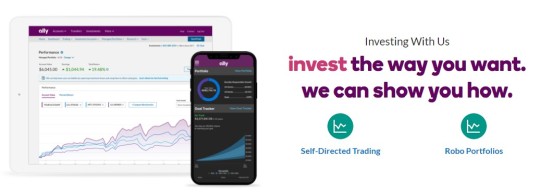
If you use Ally for your online banking, this might be a good investing choice for you. To create a Self-Directed Account, there is no minimum initial deposit. Ally Invest has a lot of tools that are both powerful and simple to use. A trading simulator and probability calculator are among the stock screener tools available for trading stocks and options.
Trades in stocks and exchange-traded funds (ETFs) are completely free. Options transactions are commission-free, however each contract costs $0.50. Access to the Managed Portfolios option is another reason to choose Ally Invest. Investors can split their account between a Managed Portfolio and a Self-Directed Account, where they can buy hand-picked equities and ETFs.
In addition, unlike other robot advisors, Ally Invest Managed Portfolios do not charge an advising fee. However, compared to other automatic investing applications, these portfolios have a greater cash balance.
6. Betterment

Because of their cheap costs, simplicity of use, and automated portfolio rebalancing, Betterment is one of the most popular "robot advisors.". They also provide free tax-loss harvesting. Betterment will strive to make tax-advantaged investments wherever feasible to limit your year-end capital gains to a minimum.
You simply need $1 to begin investing with Betterment. Betterment will invest in an ETF portfolio of stocks and bonds once you complete the first questionnaire, which assesses your investing goals and risk tolerance. As you become older and closer to retirement, Betterment will automatically move your portfolio allocation from stock-centric ETFs to more stable bonds.
Portfolios for socially responsible investment are also available. However, these funds charge greater costs than a traditional index fund approach.
The standard management charge is 0.25 percent of the entire value of your portfolio. Depending on the size of your initial contribution, you may be able to avoid paying management fees for a year.
7. Personal Capital

Personal Capital is a financial platform with two functions. Personal Capital's free budgeting software is used by many users to keep track of their spending and set financial objectives.
They also provide a free investment cost analyzer that analyzes your present investments and gives recommendations for low-fee funds that are similar. Personal Capital is also popular among those who want to keep track of their net worth.
You may invest with Personal Capital and get free access to a financial counselor if you have at least $100,000 to invest. Even if you don't have this much money to invest (yet), regardless of whatever brokerage you choose, you can track your existing investments for free.
Personal Capital might be the simplest method to view all of your money in one spot if you utilize many brokers.
8. Fidelity

Fidelity, which is one of the major online brokers, has a lot to offer.
For starters, taxable and retirement investment accounts have no account minimums. Children's investment accounts are also accessible.
It's free to trade stocks and ETFs, much like the other free investment applications. There's also a line of Fidelity ZERO index mutual funds with no fund or trading fees and a $1 minimum investment. Fractional investing is accessible for over 7,000 US equities and ETFs through the Fidelity mobile app. When using the Fidelity website on a laptop, investors must purchase entire shares.
Fidelity's analyst reports and research tools are another incentive to consider them. Many rudimentary investment applications just provide news headlines and graphing capabilities. Investors may access free third-party studies from well-known research firms while doing investing research with Fidelity.
Fidelity Go is a good option for those looking for a fully automated investing portfolio. This robo-advisor doesn’t charge an advising fee for account balances below $10,000.
9. TD Ameritrade
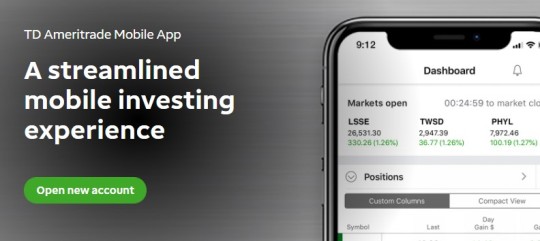
If you want powerful research tools, go at TD Ameritrade. With its online browser and mobile app, TD Ameritrade provides excellent charting capabilities and third-party analyst reports.
Its sophisticated trading platform, TD Ameritrade is available for free. Other brokers charge a premium for comparable services. Trades in stocks and exchange-traded funds (ETFs) are completely free. For both taxable and retirement accounts, there is no account minimum.
The TD Ameritrade teaching tools are beneficial to both new and seasoned investors. Short online videos and live webinars on popular investment subjects are available.
10. Public

This app may appeal to you since it does not charge for order flow (PFOF) when you purchase or sell positions. Other free applications may charge a tiny fee to market makers, and as a result, you may not obtain the best trading price. This investment software comes with a variety of customizing options:
Limit and stop orders are advanced order types that allow you to only execute a deal at a particular price rather than the current market value. You may arrange your positions into short-term and long-term investment ideas using the portfolio organizer. The program provides a push message if you sell a long-term concept before keeping your shares for at least one year.
Investing themes: The service offers investing themes that can assist you in making informed decisions on environmental, social, and market developments. Community on the internet: Connect with other investors, view their portfolios, and talk with them inside the app to exchange investment ideas and perspectives. Education tools: Basic instructional tools can help new investors gain a basic grasp of how the stock market operates.
It can be an excellent platform for novice and seasoned investors who don't require the extra investment choices offered by traditional brokerages, such as mutual funds or CDs.
Summary Without having to pay trading commissions or account fees, anybody may invest and start earning compound interest. Popular financial applications, such as the ones listed above, may make investing easier and more convenient than ever before. A free investing app can assist you whether you're investing in stocks, ETFs, or real estate.
#investment#trading app#money management#vanguard#webull#m1 finance#robin hood#ally invest#betterment#Personal Capital#Fidelity#TD ameritrade#public
4 notes
·
View notes
Text
The business plan to become an independent consultant
Becoming a consultant involves building a business plan to validate the profitability of your project and to consider the financial risk it involves, as with any business creation. It is in a business plan that you validate the market - often very competitive - then you decide your positioning and your specializations. Financial forecasts allow you to anticipate your investments (legal costs, creation of consultant contracts, hardware, and software, communication costs at start-up, etc.), to know the minimum turnover to be invoiced to remunerate you, to stimulate your taxation ... The last step of the business plan consists of choosing the appropriate legal status and validating whether the self-employed scheme, very frequent for independent consultants,
The business plan: definition
The business plan is a document that formalizes your business creation project step by step. It helps to put in place a strategy and actions to develop. It validates the market and the profitability of the activity. It makes it possible to anticipate investment needs, obstacles, and financial risks. When seeking funding, the business plan is the main tool for dialogue with funders.
The steps of the business plan to become a consultant
Market research to become a consultant
Consulting professions can face strong competition. It is, therefore, necessary to study the sector in detail. The objective will be to find elements of differentiation, even a specialization to target a niche clientele if this proves appropriate. Market research consists of studying supply and demand in the desired field. This analysis covers the following questions: Validate sufficient demand in relation to the present offer Know the expectations and needs of future customers, their criticism of the sector and the elements of the offer that trigger the act of purchase Know the strategy of your competitors, their offer and their prices, operating modes, communication vectors, reputation, specializations, competitive advantages, turnover… Validate current and future regulations Validate the opportunity to create activity on the targeted consulting profession.
Consult the turnover of your competitors
Legal persons are obliged to publish their annual accounts at the registry of the commercial court. If your competitors are in the form of a company.
From market research to strategy to become a consultant
Market research helps to position you as a consultant, but also to develop your appropriate business strategy and action plan:
Build an offer and a price list (package, package, hourly rate ...)
Deciding on a specialization if the market requires it
Decide to train or deepen your skills before you start
Set up a communication strategy (name, logo, graphic charter, communication tools)
Build a commercial action plan for the first months of the activity (strategy and budget allocated for each communication lever)
List the professionals whose activity is complementary to yours to make you known
Decide on the operating mode as a consultant (in clientele, rental of an office full time or on an ad hoc basis, remote work ...)
Financial forecasts and economic model of the consultant
The quantified stage of the business plan consists of anticipating the investments necessary to start the activity and then validating the profitability of your economic model.
Financial needs to become a consultant and the financing plan
With the financing plan, you list the investments necessary to start the activity (purchase of equipment, registration costs, communication costs, and cash ...). Such as :
Legal fees to create your general conditions of sale and your consultant contract models
Purchase of accounting tracking software
Purchase of IT tools and production tools necessary for the exercise of your activity
Communication costs (business cards, website, purchase of domain name, etc.)
Purchase of furniture, deposit, and costs to integrate an office
The economic model of the independent consultant and the forecast income statement
The provisional income statement is a table that allows you to anticipate the annual charges for the first years of activity (up to 3 years), it formalizes the economic model. The provisional profit and loss account allows you to anticipate the minimum amount of turnover that you will have to invoice to be profitable and generate a remuneration. You will then have to compare this objective to the number of clients, the volume of service and the working time it represents, per year, per month and per week.
Attention to the cash flow at start-up for a consultant
Consulting professions often develop through word of mouth and notoriety. It can, therefore, take some time to generate profitability. In this context, it is essential to provide substantial start-up cash in your financing plan. You will then be able to cope with the operating cycle and your personal financial needs, before recording a turnover.
Note that business start-up consulting professionals and accountants are used to forecasting 18 months of financial vagueness in the financial forecasts of business creators.
The legal status of the consultant
The business plan is also an opportunity to simulate its taxation and choose the optimal legal status. Many consultants start to freelance, which is to say under the legal status of a sole proprietorship (unlike the creation of a company). They then opt for the self-employed scheme, since the creation of formalities and the administrative and accounting obligations are simplified.
Please note, the choice of self- employed is common among independent consultants who require little investment at start-up and few monthly charges. But in case of more substantial financial needs, the self-employed person's regime does not allow to protect his personal patrimony nor to deduct his costs. The one-person company is then adapted into EURL (Single-Person Company with Limited Liability) or SASU (Single-Person Simplified Joint Stock Company).
We advise you to be accompanied by a chartered accountant to help you validate the different stages of your consultant business plan, but also to anticipate all your tax and social charges and guide you in the choice of your legal status. Click here!
1 note
·
View note
Text
What is GST Simulation Software? A Complete Guide
GST Simulation Software The introduction of Goods and Services Tax (GST) has transformed tax systems worldwide, simplifying taxation while posing new challenges for businesses, particularly in compliance and accurate tax calculation. GST Simulation Software has become an invaluable tool for businesses of all sizes, providing a digital solution to manage GST calculations, reporting, and…
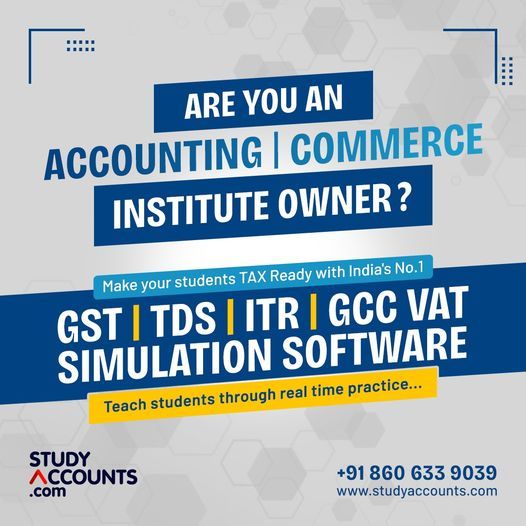
View On WordPress
#GCC vat simulation software#GST filing simulation software#GST simulation software#Gulf VAT simulation software#Income tax simulation software#ITR simulation software for institutes#TDS Simulation Software
1 note
·
View note
Text
What Is Tax Resolution Software And How Does It Work?
By law, you may be required to file an annual tax return with the Internal Revenue Service. Tax software is one of the most cost-effective ways to collect your taxes. Tax resolution software is available as online tax software from your web browser and an app downloaded to your computer or an app on your mobile phone or tablet. You can enter your financial information, including your W-2 or income, and file your federal and state tax returns electronically.
With so many highly recommended tax software options, it can be difficult to decide which one is best for your tax situation or to work with a tax professional. Here are some of the key tax software options and how they work.
How does the tax software work?
Most consumer tax programs have one of two interfaces:
• Interview-based tax software: Interview-based tax software is the most common and often the easiest to use. You don't need to know where to report returns information. Instead, interview-based programs offer a question-and-answer format that simplifies the application process and puts the right information in the right place.
• Model-based tax software - Model-based tax software simulates the layout of various tax forms and documents. You must enter the correct information in the relevant fields on your tax form.
Some of the most popular features found in both model-based software and interview software include:
• Electronic Filing - Almost all tax programs offer electronic filing. Electronic filing is the preferred method by the IRS because it is more secure and reduces errors and processing time.
• Long-term storage - Many tax programs store returns in the cloud for years, providing easy access to your returns and saving you time when filing.
• State Returns - All tax programs focus on federal tax returns and allow you to file state returns.
• Diagnosis - The tax software will notify you if you have not provided the required information and will not allow you to provide the information until you correct the error.
• Support: Almost all tax software comes with some form of support. Some have a library of basic tax laws, and others have a "help" feature and even offer live chat to help you if you get stuck.
• Suggest deductions and deductions - The tax software can suggest qualified tax deductions and deductions. However, it would be best if you decided whether you are qualified.
What is tax software?
Tax software is a type of software designed to help taxpayers prepare and file tax returns. Tax software eliminates the need to pay taxes manually. The main purpose of tax software is to automate processes. It can save you time, money and headaches while helping you comply with the latest tax laws and regulations.
Even if you have little or no tax knowledge, you will find that tax software makes tax reporting easier. Tax resolution software eliminates the need to hire professionals such as CPAs. Fortunately, most consumer-based tax software is easy to use and designed specifically for non-tax professionals.
#irs solutions tax resolution software#irs resolution software#irs transcripts#IRS resolution#Tax Practice Management Software#tax resolution software
0 notes
Text
United States Online Gambling Market Industry Trends, Analysis, Report 2022-2028
A recent study conducted by the strategic consulting and market research firm, BlueWeave Consulting, revealed that the United States Online Gambling Market was worth USD 2.65 billion in the year 2021. The market is projected to grow at a CAGR of 16.4%, earning revenues of around USD 7.61 billion by 2028. The United States Online Gambling Market is booming because of the two main drivers propelling the casino online gambling sector are the rise in consumer interest in betting and the freemium model of online gaming. The expansion of the casino online gambling market is accelerated by the rising use of smartphones, the accessibility of casino gaming platforms, and the increased penetration of the internet. The increase in internet traffic across all platforms, the implementation of social distance restrictions as a result of the COVID-19 outbreak, and the rise in the number of users of online gambling platforms, particularly during pandemic outbreaks, all have an impact on the casino online gambling market. Electronic gambling devices (EGDs) are more popular because they have software that simulates the action at a local casino, are less expensive to operate, and are widely available. However, global recession, governmental limits to curb gambling addiction, demographic shifts, and security challenges could all impede the expansion of the United States online gaming sector in the future.
Rising Internet Penetration
Furthermore, the availability of low-cost mobile applications, expanding digitalization, a variety of safe digital payment alternatives, an increase in disposable money, and an increase in the use of digital currency and websites all have a favorable impact on the casino online gaming business. Furthermore, the high frequency of gambling websites, the increase in registration, the rise in favorable online-gambling laws, and technical improvement provide profitable chances to casino online gambling market players from 2021 to 2028. Growth over the historical period was driven by robust economic growth in emerging nations, increased smartphone uses with improved internet connectivity, the rising popularity of digital payments, and an increase in disposable income. Moreover, increased gamer involvement during the Covid-19 pandemic, increasing consumer acceptance for fintech, technically advanced platforms, gambling legalization, and changing consumer gambling patterns will drive development in the future. Global recession, governmental limits to curb gambling addiction, demographic shifts, and security challenges could all impede the expansion of the online gaming sector in the future.
Sample Report @ https://www.blueweaveconsulting.com/report/united-states-online-gambling-market/report-sample
Growing Popularity of Remote Gambling
Because of the industry's complicated tax structure, casinos across the country are expected to be extremely successful. The industry of internet betting is expanding as a result of the growing popularity of remote gambling. The proportion of female casino patrons is likewise growing. Consumer convenience with the cashless payment method is what is driving the industry for online gaming. Additionally, several businesses are focusing on the development of cutting-edge platforms to meet a variety of client demands and want to get a competitive edge in the market. With the Supreme Court's legalization of sports betting in the United States in 2018, the market for online gambling enterprises is expanding significantly. For instance, Entain PLC announced the American launch of the reputable gaming app Gambling Responsibly America in 2021.
Challenge: Hacking and Cybercrime are on the Rise
According to estimates, increased hacking and cybercrime in online gaming and gambling will impede industry growth during the predetermined period. The sector is seeing a rise in cybercrime. Two key issues that endanger the growth of the sector are software hacking and signal manipulation via fraudulent applications. The online gaming business is also being impacted by an increase in the possibility of app-based theft. Additionally, a person's relationships and health may suffer as a result of compulsive gambling, which may result in despair or debt.
Segmental Coverage
United States Online Gambling Market – By Device
Based on devices, the United States Online Gambling Market is segmented into Desktop, Mobile, and Others. Among these, the desktop segment holds the largest market share. The desktop offers a larger screen than mobile phones and other devices, allowing gamblers to explore the game's features and visuals. The sound loudness, graphic clarity, and changeable storage capacity of desktop computers are further performance features that enhance gaming. These elements have assisted in the growth of the desktop market. Stunning gaming images on smartphones made possible by modern mobile phone technology have increased access to online gambling on mobile devices. Gamblers' convenience is increased by the availability of mobile gambling. The mere fact that inexpensive mobile phones are readily available, as well as newer features like enhanced graphics and more storage capacity, support category growth.
Impact of COVID-19 on United States Online Gambling Market
The COVID-19 outbreak has had an impact on all aspects of society, including people and corporations. The internet ecosystem has been critical all over the world. The casino and gambling sectors have been particularly heavily hit by the COVID-19 outbreak. The COVID-19 outbreak has increased the reliance on player monitoring, security, and surveillance technologies. Casinos and resorts use casino management solutions to provide the services that their clients require.
Competitive Landscape
The leading market players in the United States Online Gambling Market are Rivers Casino, MGM Resorts International, Cherry Gold Casino, 888 Holdings PLC, Eldorado Resorts Inc, Flutter Entertainment, DraftKings, Churchill Downs, FanDuel, Golden Nugget, PokerStars, and other prominent players. The United States Online Gambling Market is highly fragmented with the presence of several manufacturing companies in the country. The market leaders retain their supremacy by spending on research and development, incorporating cutting-edge technology into their goods, and releasing upgraded items for customers. Various tactics, including strategic alliances, agreements, mergers, and partnerships, are used.
About Us
BlueWeave Consulting provides comprehensive Market Intelligence (MI) Solutions to businesses regarding various products and services online and offline. We offer all-inclusive market research reports by analyzing both qualitative and quantitative data to boost the performance of your business solutions. BWC has built its reputation from the scratch by delivering quality inputs and nourishing long-lasting relationships with its clients. We are one of the promising digital MI solutions companies providing agile assistance to make your business endeavors successful.
Contact Us:
BlueWeave Consulting & Research Pvt. Ltd
+1 866 658 6826 | +1 425 320 4776 | +44 1865 60 0662
0 notes
Text
Advantages of Accounting Taxation Courses in Business
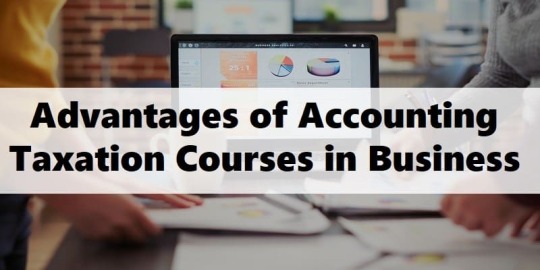
Financing , auditing and taxation are crucial to the very structure of business in order to thrive and grow. A person who encompasses these abilities is deemed as capable and perfect for an organization’s financial expansion and profitable outcomes. But where can one learn about all this?
Courses such as Business accounting taxation come under the commerce stream undertaken by students who pursue their bachelors degree in the same. The entire course module is structured in such a way that it envelops almost all arenas of accounting with valuable advice and inputs from industry wizards.
Chapters like direct taxes, MS excel , advanced accounting, indirect taxes and other essential skills are covered in the syllabus which makes a person capable enough to prove themselves as a worthy asset in the cosmos of business. One can opt for the account taxation course in Ahmedabad from s20.in to understand and dive deeper into the world of accounting!
Role of business accounting
Business accounting is that necessary fuel that augments businesses and organizations as a whole to new levels. Accounting is inseparable from business just like how magnets remain inseparable. Given below are some of the important functions that business accounting contributes:
Monitoring all the incomes and disbursement of finances.
Ensuring rightful co-operation and adherence to the laws.
Cracking complex problems and arriving at sustainable solutions.
Giving appropriate assessment and valuable financial data to potential authorities and investors.
On comprehension of the business accounting taxation, one gets acquainted to 3 types of statements:
The income statement
Produces a detailed account on all the gains and losses.
Balance sheet
Generates a no mistake report about the financial position of the organization at a specific date.
Cash flow statement
This acts as a prominent link between the income statement and the balance sheet. It keeps a systematic account of monetary inflow and outflow during a definite period of time.
In today’s world of cut throat competition, organizations are always on the hunt to seek out highly skilled professionals replete with the skills that may prove them to be an asset.
Potential candidates should possess the following:
Design financial statements
Compose balance sheets
Transactions pertaining to taxes
E-filing of income tax returns
Tax crediting
Making Journal entries.
Eligibility criteria for a business accounting taxation course
The eligibility stands as follows;
Fresh graduates who are on the lookout for a job in accounting and taxation.
Any commerce graduate
Students from allied streams like B.B.A, MBA,MCom and B.Com honors.
Amateur or experienced accounting professionals.
Apart from learning this course, students can easily undertake and hone other skills similar to accounting to upgrade their resume and grab the desired job role.
Some of these skills include:
Advanced Excel
Goods and Service Tax (GST)
Income tax
Payroll management
Practical accounting.
The need to pursue accounting taxation course in Ahmedabad
The reasons have been listed below.
Professional certificate for proof of completion of course and another feather to your hat.
Education by industry experts
Imbibing knowledge on the latest software- Tally
Practicals on payroll management.
Simulated training
Case study learning
The syllabus is up to date and industry oriented.
Course can be easily completed with 100 % placements.
Accounting process training.
The course can be opted offline or online with remote accessibility.
The benefits of learning the accounting taxation course for learners and businesses
The benefits have been listed below;
Accounting professionals have a great demand in both the public and private sectors.
As a learner, once you finish the course , you are likely to get better opportunities with an impressive payscale than your peers.
You tend to comprehend the nitty gritties and details of accounting and its management in an organization.
The course offered is curated by industry specialists and experts with hands-on accounting training equipped with modern accounting software.
Tally ERP, one of the most popularly used software can be learnt via this course.
Get a guaranteed job or start working as a freelance accounting consultant.
Non -commerce candidates needn’t worry as the course caters to all types of students who are passionate about accounting and finances.
In depth learning on GST course in Ahmedabad and the Indian economical landscape.
Gaining expertise on accounting skills, making them competent enough to thrive in the business corporations.
High profile job opportunities with business accounting
Accounting Manager
Certified Public Accountant
Certified Industrial Accountant
Chief Financial Officer
Chartered Management Accountant
Company Secretary
Directors (Finance)
Finance Managers
Financial Controllers
Financial Advisors
GST Consultant
Tally Expert
Conclusion
Accounting and taxation are essential aspects for the growth of any business be it small or big. And if you are someone who aspires to make their own niche in the world of business and climb up the corporate ladder, then it is important to gain your skillset to put your best foot forward.
Courses on business accounting and taxation are available with chapters and modules updated according to the latest industry setting and making individuals capable of solving real world business problems. These courses are of short duration and are crafted by experts.
On completion of the course, one gets to understand varied concepts such as taxes, filing returns, the concept of goods and service taxes, how the Indian economy functions and what inputs can be provided to upgrade the financial position of a particular company.
Being an expert in the finance and accounting sector opens new doors of opportunities for you as you have increased probability of securing a high pay job. Although commerce graduates and students having basic knowledge of accounting are preferred, the course can be undertaken by anyone.
Original Published: https://s20.in/blog/benefits-accounting-taxation-courses-business/
0 notes